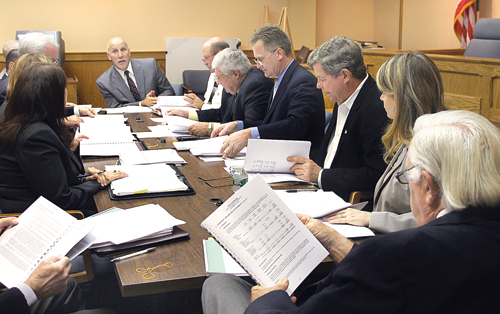Long term CPF debt looms large in Riverhead

While Riverhead Town officials are primarily concerned with overcoming a deficit in the town’s general fund next year – which will be closed with $3.5 million in reserves – they say a deficit in the Community Preservation Fund looms even larger.
Auditors contracted by the town, along with members of the town’s independent audit committee, found that about $19 million remains in the CPF, according to findings presented at last Thursday’s Town Board work session.
The CPF, approved by referendum among East End voters in 1999, taxes real estate transfers to set aside funds for land preservation purchases.
In the early 2000s, town leaders started borrowing against future CPF revenues to buy open land before an anticipated rise in real estate values. But the real estate market then stalled, and revenues to pay off the debt have not come in as expected, leaving an annual shortfall of nearly $4 million. The town owes about $6 million each year to pay down the principal and interest on money borrowed for the land purchases.
Supervisor Sean Walter said the real estate market has to improve, or else.
“In 2018, if things don’t turn around … we’d run out of money [in the CPF],” he said in an interview. “The picture’s not very bright.”
While a deficit remains in the CPF fund, the real estate market does seem to be rebounding, suggested by this year’s rising CPF revenues, according to numbers provided by Assemblyman Fred Thiele (I-Sag Harbor).
Riverhead has brought in $1.62 million through August, an increase of 45 percent over last year’s $1.11 million. Across the entire East End, CPF funds are up to $58.5 million, up from $39.2 million in 2012.
Despite the improvement, Mr. Walter described the CPF debt as a “structural deficit problem.”
“They ran the town like it was a giant credit card,” Mr. Walter said, referring to the previous administration under Democrat Phil Cardinale. “Here’s the key: they never went to anybody … to determine if the revenue would ever support the amount financed.”
Since the town’s CPF debt far exceeds the amount of CPF money taken in, Mr. Walter predicted the town will have to start using general fund money to refill the CPF funding in 2019. The town will then have to use reserves from its general fund for eight years, until the CPF is expected to bring back in enough to pay its debt, he said.
Though Mr. Walter blamed the Cardinale administration for the bleak outlook, Long Island Pine Barrens Society executive director Richard Amper said the town “did the CPF right.”
Mr. Amper said the town hasn’t received the funding they expected from taxes due to the recession, adding the town accomplished what it set out to do by preserving land and preventing over-development.
“The likelihood that the town will have to underwrite the cost of payment from the general fund is slim to none,” Mr. Amper said, noting he last calculated his figures in 2010.








